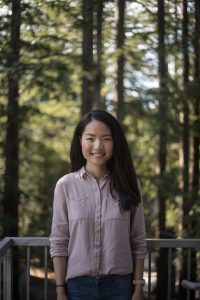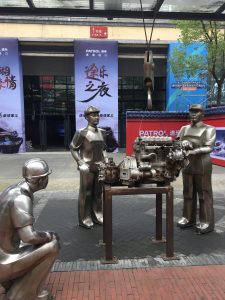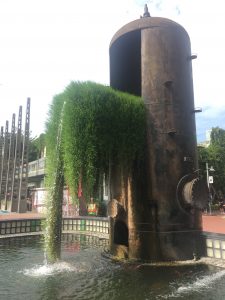Graduate Profile: Sarah Chang, History Doctoral Student
 In her research, History Doctoral Student Sarah Chang investigates the lifecycle of the postwar factory in China, and the shift for women workers from the home to paid industrial work during the socialist period.
In her research, History Doctoral Student Sarah Chang investigates the lifecycle of the postwar factory in China, and the shift for women workers from the home to paid industrial work during the socialist period.
Chang is a 2018 UCSC-SSRC DPD fellow. Her fellowship summer research took her to Chengdu, China, where she interviewed retired women workers and visited archives, a local museum, worker residence compounds, and a theme park dedicated to the city’s industrial history. THI spoke with her about what she saw, encountered, and learned on her three-month research visit.
Congratulations on receiving a 2018 Social Science Research Council Dissertation Proposal Development Program fellowship! Your research sounds rich and nuanced. Can you tell us more about it?
My research is concerned with everyday life and labor for women workers in China from the socialist period to the economic reforms. I am interested in how the socialist state tried to transform gender relations by drawing young urban women out of the home and into paid industrial work. As I examine new social relations and identities which emerged as a result of women’s participation in industrial production, I also ask how notions of gender that naturalized women’s free domestic labor in the home were reinforced by the state and factory authorities. Starting in the late 1970s, socialism gradually shifted toward state capitalism, and many state factories closed down. My project addresses how the demise of the socialist factory posed new challenges to women workers’ labor and life and how they sought to defend their own sense of identity and community in the face of a new social order.
Where did you research in 2018 take you?
I used my SSRC-DPD grant in 2018 for a three-month-long summer research trip to Chengdu. While there, I was able to consult archival sources and get in touch with local contacts who facilitated oral history interviews with retired women workers. I was also able to visit still-existing worker residence compounds, the local museum of industrial development, and a theme park dedicated to the city’s industrial history.

My research last summer helped me develop a clear understanding of both the richness and limitations in sources currently available for my project. In turn, it pushed me to experiment with new frameworks which can open up my project for new possibilities. Specifically, my site visits to worker residence compounds and the local industrial theme park made me think about how the organization and construction of space are constitutive of notions and practices of gender and labor. This observation led me to re-examine my sources and search for new sources that might trace the transformations of factory and urban spaces as reflective of the kinds of social transformations I am interested in for my project.
How has your dissertation research, and direction, changed as a result of the course of your DPD research?
As a result of my summer research funded by the SSRC-DPD program, I became much more interested in theories of space and Chinese urban history. I came to see how the distribution of space, representations within factory/city space, and discourses about space were part and parcel of a state project to manage gendered labor and every life. At the same time, spatial politics was and continues to be a site of expression for women workers through which they articulated their concerns, needs, and demands. This is best exemplified by the ways in which women workers strategically challenged spatial boundaries imposed by the state and contested meanings attributed to specific spaces by state and factory authorities.

Where are you now? What are you pursuing, and how have the first two years of pre-dissertation work influenced your path to this point?
I am currently lost in the world of preparing for my qualifying exam, which has given me an opportunity to revisit past literature in my field and learn about scholarly fields previously unfamiliar to me, such as urban studies.
The past two years at UCSC have taught me much about the differences between envisioning a dissertation project and executing it. While some of those lessons were learned in the field, others became clear during discussions with my teachers and peers about what it is that my project hopes to accomplish. The interdisciplinary approach of the DPD program and within my own department has been inspirational and useful. Learning from scholars across the humanities and social sciences has placed new tools in my toolbox for disentangling and making sense of my encounters in the field.
